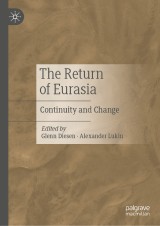Details

The Return of Eurasia
Continuity and Change|
128,39 € |
|
| Verlag: | Palgrave Macmillan |
| Format: | |
| Veröffentl.: | 23.07.2021 |
| ISBN/EAN: | 9789811621796 |
| Sprache: | englisch |
Dieses eBook enthält ein Wasserzeichen.
Beschreibungen
<p>This book defines Eurasianism, a political idea with a long tradition, for a new century. Historically, Eurasia was depicted as a “third continent” with a geographical and historical space distinctively different from both Europe and Asia. Today, the concept is mobilized by the Russian foreign policy elite to imagine a close relationship with China and indirectly inspires the Chinese Belt and Road Initiative. A Russian-Chinese partnership forms the core of a new Eurasian region, yet Turkey, India, Hungary, Central Asia and the other parts of the supercontinent are also embracing Eurasian concepts. This book is of interest to scholars of Russian and Chinese foreign policy, to economists, and to scholars of political thought.</p>
Sad Delusions: From Greater Europe to Greater Eurasia<div>Richard Sakwa</div><div><br></div><div>Greater Eurasia: From Geopolitical Pole to International Society?</div><div>Alexander Lukin, Dmitry Novikov</div><div><br></div><div>Asia before Eurasianism: The Pre-Revolutionary Roots of a Russian Emigré Ideology</div><div>David Schimmelpenninck van der Oye</div><div><br></div><div>Greater Eurasia as a Conservative Initiative</div><div>Glenn Diesen</div><div><br></div><div>Central Asia in Eurasia: Its Role in History</div><div>Sultan Akimbekov</div><div><br></div><div>China’s Eurasian Ideas and the Silk Road Projects</div><div>Gao Fei and Li Li</div><div><br></div><div>Turkey’s Return to Eurasianism: Is it real or just a pragmatic discourse?</div><div>Göktürk Tüysüzoğlu</div><div><br></div><div>Hungarian Turanism: Eurasianism <i>à la hongroise</i>?</div><div>Balázs Ablonczy</div><div><br></div><div>Finding compatibility between Eurasian Partnership and Indo-Pacific security: an Indian perspective</div><div>P.S.Raghavan</div><div><br></div><div>Is Southeast Asia ‘Eurasian’?</div><div>Bilahari Kausikan </div><div><br></div><div>The United States and Eurasia in Historical Perspective</div><div>Thomas Graham</div>
<p><b>Glenn Diesen</b> is Professor at the University of South-Eastern Norway (USN). His research focus is Russia’s Greater Eurasia Initiative as a geoeconomic and conservative concept. Diesen’s latest books are <i>EU and NATO relations with Russia: After the collapse of the Soviet Union</i> (2015); <i>Russia’s Geoeconomic Strategy for a Greater Eurasia</i> (2017); <i>The Decay of Western Civilisation and Resurgence of Russia: Between Gemeinschaft and Gesellschaft</i> (2018); <i>Russia in a Changing World </i>(2020); Russian Conservatism: Managing Change under Permanent Revolution (2021); and <i>Great Power Politics in the Fourth Industrial Revolution: The Geoeconomics of Technological Sovereignty </i>(2021).<b> </b></p><p></p><p> <b>Alexander Lukin</b> is Head of Department of International Relations and International Laboratory on World Order Studies and the New Regionalism at National Research University Higher School of Economics (HSE University). He is the author of <i>The Political Culture of the Russian Democrats</i> (Oxford University Press, 2000), <i>The Bear Watches the Dragon: Russia’s Perceptions of China and the Evolution of Russian-Chinese Relations since the Eighteenth Century</i> (M.E.Sharpe, 2003), <i>Grasping Russia with your Mind</i> (with Pavel Lukin, Ves’ Mir, 2015, in Russian), <i>Pivot to Asia: Russia’s Foreign Policy Enters the 21<sup>st</sup> Century</i> (Vij Books India, 2016), <i>China and Russia:</i> <i>The New</i> <i>Rapprochement</i> (Polity, 2018), <i>Russia: A Thorny Transition from Communism</i> (Vij Books India, 2019), as well as numerous articles and policy papers on international relations, Russian and Chinese politics.<br></p><p></p>
<div>This book defines Eurasianism, a political idea with a long tradition, for a new century. Historically, Eurasia was depicted as a “third continent” with a geographical and historical space distinctively different from both Europe and Asia. Today, the concept is mobilized by the Russian foreign policy elite to imagine a close relationship with China and indirectly inspires the Chinese Belt and Road Initiative. This book is of interest to scholars of Russian and Chinese foreign policy, to economists, and to scholars of political thought.<b><br></b></div><b><div><b><br></b></div>Glenn Diesen</b> is Professor at the University of South-Eastern Norway (USN). His research focus is Russia’s Greater Eurasia Initiative as a geoeconomic and conservative concept. Diesen’s latest books are <i>EU and NATO relations with Russia: After the collapse of the Soviet Union</i> (2015); <i>Russia’s Geoeconomic Strategy for a Greater Eurasia</i> (2017); <i>The Decay of Western Civilisation and Resurgence of Russia: Between Gemeinschaft and Gesellschaft</i> (2018); <i>Russia in a Changing World </i>(2020); Russian Conservatism: Managing Change under Permanent Revolution (2021); and <i>Great Power Politics in the Fourth Industrial Revolution: The Geoeconomics of Technological Sovereignty </i>(2021).<b> </b><p></p><p><b>Alexander Lukin</b> is Head of Department of International Relations and International Laboratory on World Order Studies and the New Regionalism at National Research University Higher School of Economics (HSE University). He is the author of <i>The Political Culture of the Russian Democrats</i> (Oxford University Press, 2000), <i>The Bear Watches the Dragon: Russia’s Perceptions of China and the Evolution of Russian-Chinese Relations since the Eighteenth Century</i> (M.E.Sharpe, 2003), <i>Grasping Russia with your Mind</i> (with Pavel Lukin, Ves’ Mir, 2015, in Russian), <i>Pivot to Asia: Russia’s Foreign Policy Enters the 21<sup>st</sup> Century</i> (Vij Books India, 2016), <i>China and Russia:</i> <i>The New</i> <i>Rapprochement</i> (Polity, 2018), <i>Russia: A Thorny Transition from Communism</i> (Vij Books India, 2019), as well as numerous articles and policy papers on international relations, Russian and Chinese politics.</p><br><p></p>
<p>Explores the concept of Eurasianism and its historical revival</p><p>Collects a wide range of international scholars to explore the shifting dynamics between Russia, China and central Asian states</p><p>Provides context for Russian foreign policy</p>
Diese Produkte könnten Sie auch interessieren:

How Insights from Moral Psychology and Character Research can aid Development Cooperation

von: Jan Prothmann

13,99 €
















